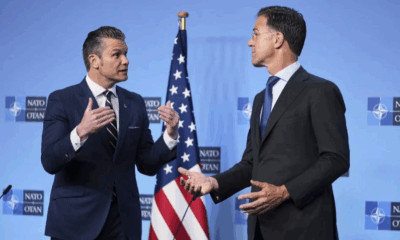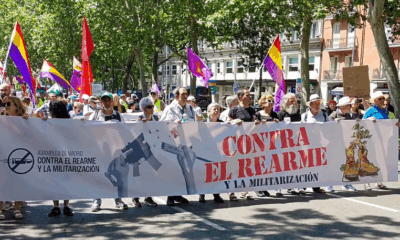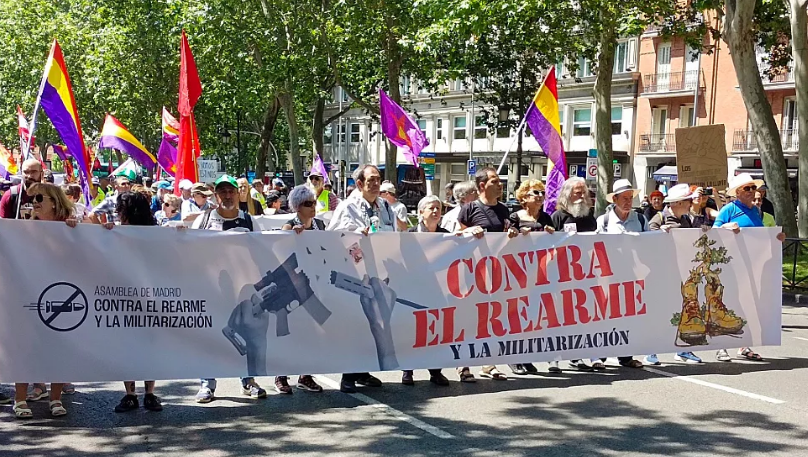News
Russian Drone Strike Kills Nine in Ukraine Hours After Peace Talks
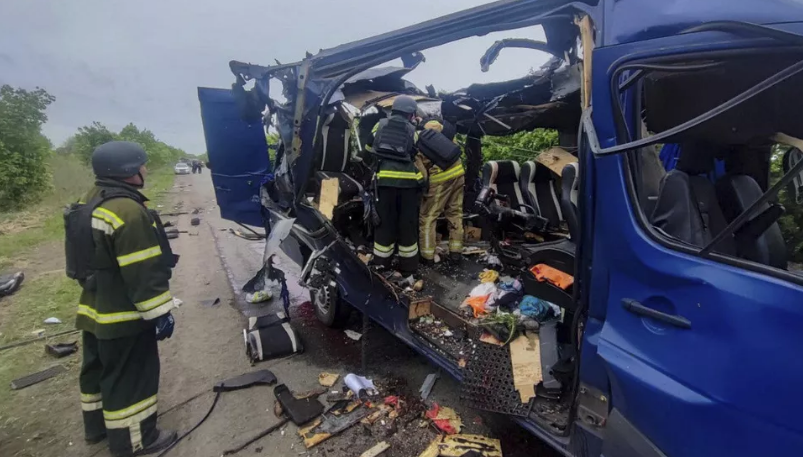
A Russian drone strike on a civilian bus in Ukraine’s northeastern Sumy region has left nine people dead and four others injured, in what Ukrainian officials are calling a deliberate attack on non-combatants.
The assault took place early Saturday in the town of Bilopillia, located roughly 10 kilometers from the Russian border. According to regional authorities, the drone hit a passenger bus, killing mostly elderly civilians. Three of the four wounded are reported to be in serious condition and are receiving treatment at a hospital in Sumy city.
The Sumy Regional Administration condemned the strike in a statement on Telegram, calling it “another war crime by Russia — a deliberate strike on civilian transport that posed no threat.”
The attack came just hours after Ukrainian and Russian delegations held face-to-face discussions in Turkey — the first direct peace talks in several years. While seen as a potential diplomatic breakthrough, the negotiations ended without a ceasefire agreement.
Photos released by Ukraine’s national police showed the charred remains of the bus and the surrounding area littered with debris, highlighting the devastating impact of the strike. Authorities are working to identify the deceased, many of whom are believed to be elderly women traveling within the region.
In response to the tragedy, local officials in Bilopillia declared a period of mourning until Monday. Yurii Zarko, head of the local community, described the day of the strike as “Black Saturday,” reflecting the grief and anger felt throughout the region.
The drone attack is part of a broader pattern of strikes on civilian infrastructure across Ukraine, as fighting continues along the front lines in the east and south of the country. Kyiv has repeatedly accused Moscow of targeting non-military sites in violation of international law — accusations the Kremlin denies.
The incident underscores the fragility of the current diplomatic efforts and the escalating toll on civilians as the war stretches into its third year. Despite renewed international calls for de-escalation, both sides remain deeply entrenched, with little sign of a breakthrough on the horizon.
News
US Appoints New NATO Commander as Allies Boost Defence Spending Ahead of Summit
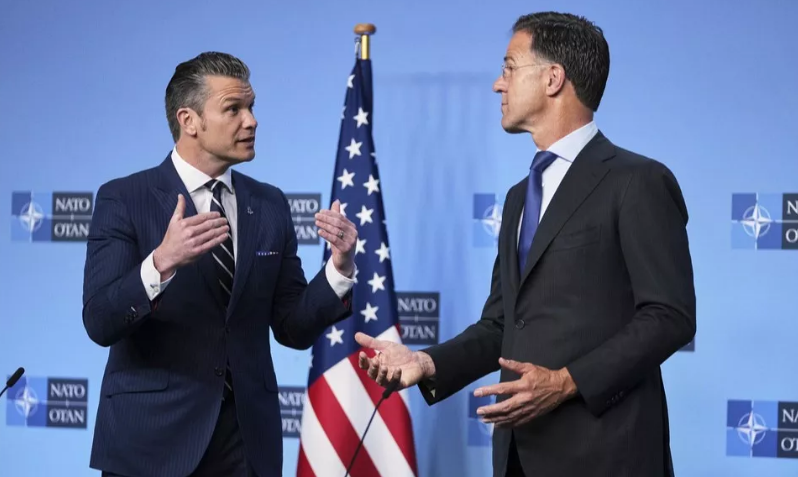
The United States has appointed Lieutenant General Alexus G. Grynkewich as the next Supreme Allied Commander Europe (SACEUR), a decision welcomed by NATO allies amid growing concerns over the alliance’s future posture toward Russia. The appointment comes just weeks before a pivotal NATO summit in The Hague and signals Washington’s continued military commitment to Europe.
Lt. Gen. Grynkewich, who will also serve as the top U.S. general in Europe, will succeed General Christopher G. Cavoli in the summer of 2025 following national confirmation procedures. NATO has traditionally looked to the United States to fill the SACEUR position, a practice dating back to 1951 when General Dwight D. Eisenhower held the inaugural role.
“There is a sense of relief across NATO,” a U.S.-based official told Euronews, noting that recent speculation over whether Washington might relinquish the leadership post had sparked unease. “This is a positive sign of American engagement and staffing.”
In parallel, NATO defence ministers have agreed to a sweeping set of new spending targets, committing member states to increase defence budgets to 5% of GDP. The updated strategy breaks down this figure into 3.5% for “core defence” needs—such as heavy weapons, tanks, and air defence systems—and 1.5% for related areas like cyber capabilities, surveillance, and infrastructure. The specifics of how these targets will be implemented are still under negotiation.
“These targets describe exactly what capabilities Allies need to invest in over the coming years,” said NATO Secretary General Mark Rutte. He stressed the urgency of these measures, warning that without immediate action, NATO could face serious security risks in the near future.
“If we don’t act now, the next three years we are fine,” Rutte said. “But from three, four, or five years from now, we are really under threat.”
U.S. Ambassador to NATO Mathew Whitaker echoed the sentiment, urging allies to make “credible progress” on defence investment. “Our adversaries are not waiting for us to be ready,” he said, while also emphasizing the importance of Europe stepping up its support for Ukraine.
Despite the renewed show of unity, concerns remain over the direction of U.S. policy under President Trump, particularly regarding Ukraine. According to the same U.S. official, Trump may push to limit Ukraine’s presence at the upcoming NATO summit, citing its non-member status. “Trump just doesn’t care about Europe—it doesn’t help him politically,” the source added.
The Hague summit, scheduled for late June, is expected to solidify NATO’s new defence targets and address the alliance’s role in long-term support for Ukraine.
News
Left-Wing Protest in Madrid Condemns Spain’s Planned Military Spending Hike
News
Two Dead, Nearly 200 Injured as PSG Title Celebrations Turn Violent Across France

What began as jubilant celebrations of Paris Saint-Germain’s historic UEFA Champions League victory ended in violence and tragedy in parts of France, with two people killed and nearly 200 injured during street festivities that spiraled out of control.
Authorities confirmed on Sunday that a 17-year-old boy was fatally stabbed in the southwestern town of Dax during a PSG street gathering, while in Paris, a man died after his scooter was struck by a car amid the crowded celebrations. Both incidents are currently under investigation.
The unrest followed PSG’s dramatic win in Munich, where the club secured its first-ever Champions League title, marking a milestone in French football history. While fans across the country took to the streets to celebrate, several areas descended into violence.
According to the French Interior Ministry, a total of 294 people were arrested nationwide as of 2 a.m. Sunday. Of the nearly 200 injured, 21 were police officers—18 of them in Paris alone. One officer remains in a medically induced coma after being struck in the face by a firework.
Interior Minister Bruno Retailleau condemned the violence in a statement on social media. “True PSG fans are celebrating a magnificent achievement. Meanwhile, barbarians have taken to the streets to commit crimes and provoke law enforcement,” he said. “It is unacceptable that people cannot celebrate without being endangered by a violent minority.”
Despite the unrest, the majority of gatherings were peaceful, authorities noted, with large crowds celebrating the historic win in cities including Marseille, Lyon, and Lille.
The PSG squad returned to Paris from Munich on Sunday afternoon aboard a Qatar Airways charter flight, arriving at 4 p.m. The team is expected to continue celebrations in the capital with tens of thousands of fans, under heightened security measures.
The violent turn of events has reignited debate in France over crowd control during major sporting celebrations, and how best to ensure public safety without dampening national enthusiasm.
PSG’s Champions League triumph marks a defining moment for the club, which has long pursued European glory. As the team prepares for a hero’s welcome, officials are urging fans to celebrate responsibly and respect public safety.
-

 Business1 year ago
Business1 year agoSaudi Arabia’s Model for Sustainable Aviation Practices
-

 Business1 year ago
Business1 year agoRecent Developments in Small Business Taxes
-

 Politics1 year ago
Politics1 year agoWho was Ebrahim Raisi and his status in Iranian Politics?
-

 Business11 months ago
Business11 months agoCarrectly: Revolutionizing Car Care in Chicago
-

 Business11 months ago
Business11 months agoSaudi Arabia: Foreign Direct Investment Rises by 5.6% in Q1
-

 Technology1 year ago
Technology1 year agoComparing Apple Vision Pro and Meta Quest 3
-

 Politics1 year ago
Politics1 year agoIndonesia and Malaysia Call for Israel’s Compliance with ICJ Ruling on Gaza Offensive
-

 Sports10 months ago
Sports10 months agoKeely Hodgkinson Wins Britain’s First Athletics Gold at Paris Olympics in 800m

